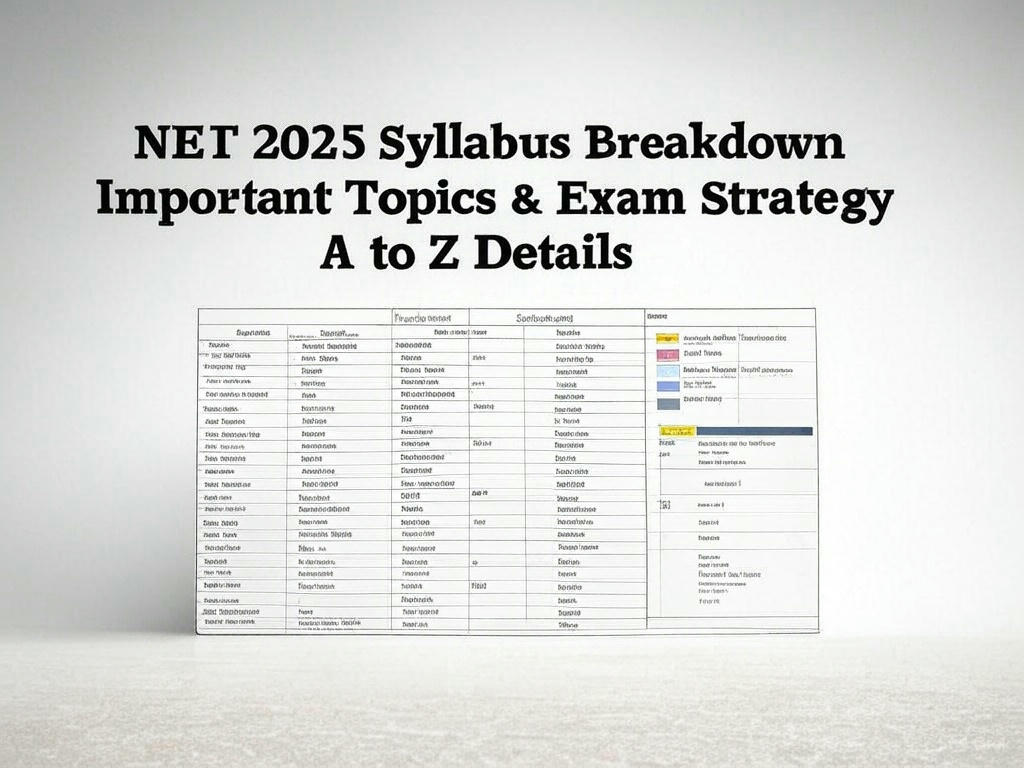NEET 2025: A to Z Details
A – About NEET 2025
NEET is the sole entrance exam for admission to undergraduate medical courses (MBBS, BDS, AYUSH, etc.) in India. It tests Physics, Chemistry, and Biology (Botany + Zoology) based on NCERT Class 11 and 12 syllabi.
B – Basic Exam Details
- Date: May 4, 2025 (tentative, based on NTA trends).
- Mode: Pen-and-paper (offline).
- Duration: 3 hours (180 minutes).
- Questions: 180 MCQs (compulsory).
- Marks: 720 total (4 marks per correct answer, -1 for incorrect).
C – Core Subjects
- Physics: 45 questions (180 marks).
- Chemistry: 45 questions (180 marks).
- Biology: 90 questions (360 marks; 45 Botany + 45 Zoology).
D – Detailed Syllabus Breakdown
The syllabus is based on NCERT Class 11 and 12 textbooks, finalized by NMC in December 2024. Below is a subject-wise breakdown:
- Physics (20 units):
- Class 11: Physical World, Motion, Laws of Motion, Work-Energy-Power, Gravitation, Thermodynamics, Properties of Matter, Oscillations, Waves.
- Class 12: Electrostatics, Current Electricity, Magnetic Effects, EMI, AC, EM Waves, Optics, Dual Nature, Atoms, Nuclei, Semiconductors.
- Chemistry (30 units):
- Physical Chemistry: Mole Concept, Atomic Structure, Thermodynamics, Equilibrium, Solutions, Chemical Kinetics, Electrochemistry.
- Organic Chemistry: Hydrocarbons, Alcohols, Aldehydes-Ketones, Carboxylic Acids, Amines, Biomolecules, Polymers.
- Inorganic Chemistry: Periodic Table, Chemical Bonding, Coordination Compounds, p-Block, d- & f-Block Elements.
- Biology (11 units):
- Botany: Diversity, Plant Physiology, Cell Biology, Reproduction, Genetics, Ecology.
- Zoology: Human Physiology, Reproduction, Genetics, Evolution, Biotechnology, Ecology.
E – Exam Pattern
- Structure: 180 questions (no optional Section B as in 2021-2023; reverted to pre-COVID format).
- Marking: +4 for correct, -1 for incorrect, 0 for unattempted.
- Languages: Available in 13 languages (English, Hindi, Tamil, etc.).
F – Focus Areas (Important Topics)
Based on past trends and weightage:
- Physics: Mechanics (25%), Electrodynamics (20%), Thermodynamics (10%), Optics (10%).
- Chemistry: Organic Chemistry (35%), Physical Chemistry (30%), Inorganic Chemistry (35%).
- Biology: Human Physiology (20%), Genetics & Evolution (18%), Ecology (15%).
G – Goals of Preparation
- Master NCERT content.
- Achieve 600+ marks for top colleges (e.g., AIIMS).
- Balance speed and accuracy.
H – High-Weightage Topics
- Physics: Laws of Motion, Electrostatics, Thermodynamics, Ray Optics.
- Chemistry: Chemical Bonding, Mole Concept, Coordination Compounds, Hydrocarbons.
- Biology: Human Physiology, Genetics, Plant Physiology, Diversity in Living World.
I – Importance of NCERT
- 80-90% of questions are NCERT-based.
- Memorize diagrams, tables, and examples (especially Biology).
J – Justify Your Strategy
A structured plan targeting high-weightage topics and regular practice ensures success in this competitive exam.
K – Key Resources
- Books: NCERT (mandatory), HC Verma (Physics), OP Tandon (Chemistry), Trueman’s Biology.
- Online: NTA mock tests, ALLEN/Vedantu resources.
L – Learning Approach
- Understand concepts first, then practice MCQs (150-200 per topic).
- Revise weekly to retain facts.
M – Mock Tests
- Take 1-2 full-length tests weekly (180 questions, 3 hours).
- Analyze errors to improve weak areas.
N – Negative Marking
- Avoid guesswork; attempt only confident answers to minimize -1 penalties.
O – Official Updates
- Syllabus PDF: Available at nmc.org.in and neet.nta.nic.in (released December 2024).
- Exam Date: Confirmed February 7, 2025, by NTA.
P – Preparation Timeline
- March-May 2025: Complete syllabus, focus on NCERT, practice 50-100 MCQs daily.
- April 2025: Intensify mock tests, revise high-weightage topics.
Q – Quick Tips
- Memorize formulas (Physics/Chemistry).
- Focus on Biology for quick scoring (50% of marks).
- Time management: ~1 minute per question.
R – Revision Strategy
- Daily: 1 hour on weak topics.
- Weekly: Full syllabus recap using notes/mind maps.
S – Subject-Wise Strategy
- Physics: Solve numericals (Mechanics, Electrostatics), understand derivations.
- Chemistry: Master Organic reactions, practice Physical Chemistry calculations.
- Biology: Memorize NCERT line-by-line, focus on diagrams.
T – Table of Weightage (Approximate)
| Subject | Topic | Weightage (%) | Questions (Est.) |
|---|---|---|---|
| Physics | Mechanics | 25% | 11-12 |
| Electrodynamics | 20% | 9-10 | |
| Chemistry | Organic Chemistry | 35% | 15-16 |
| Inorganic Chemistry | 35% | 15-16 | |
| Biology | Human Physiology | 20% | 18-20 |
| Genetics & Evolution | 18% | 16-18 |
U – Understanding Concepts
- Physics: Focus on application (e.g., Newton’s Laws).
- Chemistry: Learn reaction mechanisms (e.g., SN1/SN2).
- Biology: Grasp processes (e.g., Photosynthesis).
V – Variety of Questions
- Expect theoretical (Biology), numerical (Physics), and mixed (Chemistry) questions.
W – Weak Areas
- Identify via mock tests (e.g., Thermodynamics, p-Block).
- Allocate extra time to improve.
X – X-Factor (Edge)
- Solve past 10 years’ papers (2015-2024).
- Join crash courses (e.g., ALLEN) for last-minute boosts.
Y – Yearly Trends
- Biology remains scoring; Physics often toughest.
- 2024 saw increased focus on Class 12 topics.
Z – Zero Stress
- Sleep 6-8 hours daily.
- Stay confident with consistent preparation.
Exam Strategy
- Time Allocation:
- Physics: 50-60 min (numericals take time).
- Chemistry: 40-50 min (balanced difficulty).
- Biology: 60-70 min (quick but voluminous).
- Order: Start with Biology (high marks, less time), then Chemistry, finish with Physics.
- Accuracy: Aim for 90%+ accuracy in Biology, 80% in Chemistry/Physics.
- Mock Practice: Simulate exam conditions weekly.
Notes
- Syllabus Source: NMC’s December 2024 update; no major changes from 2024.
- Updates: Check neet.nta.nic.in for admit card (April 2025) and final details.
- Target: 600+ marks for top ranks (General: ~650, OBC/SC/ST: ~550).
This guide equips you with a roadmap to ace NEET 2025. Let me know if you need more specific topic breakdowns or practice questions!
